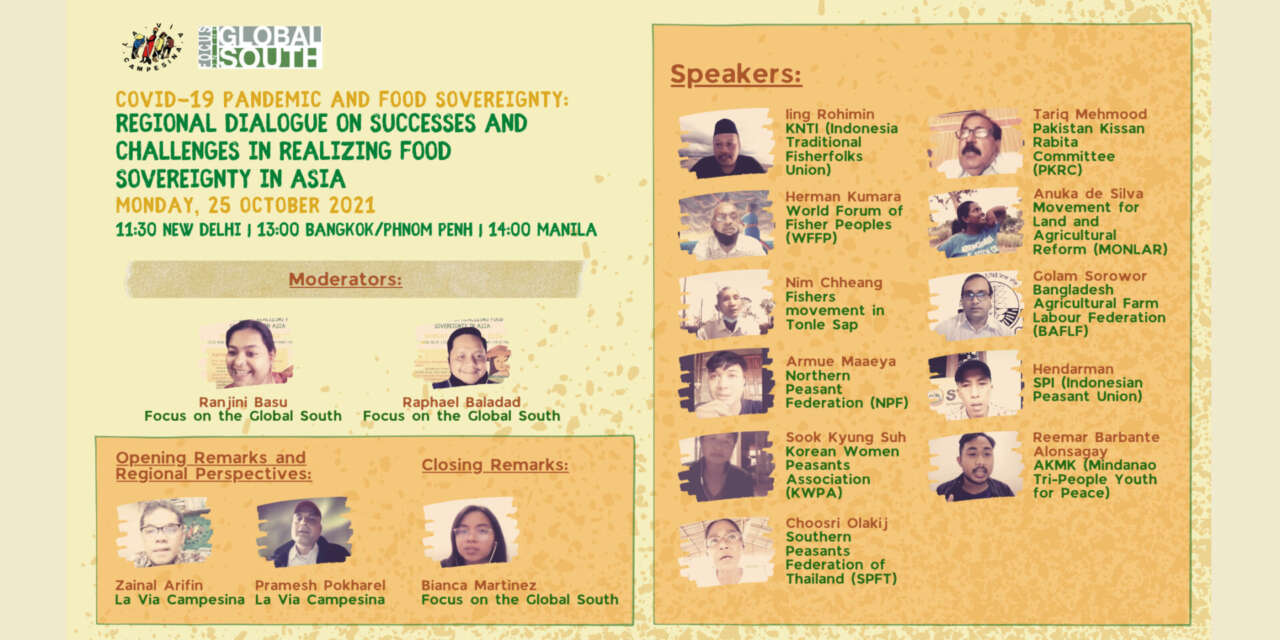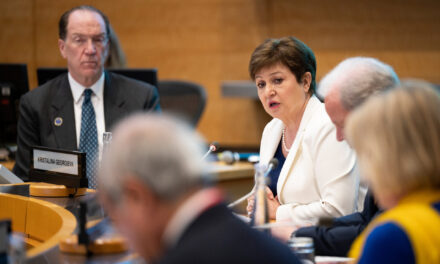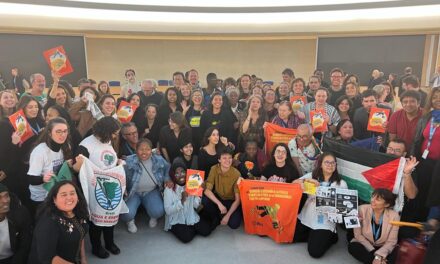Ranjini Basu and Raphael Baladad from Focus on the Global South moderated the session, starting with the aim of the dialogue to highlight the challenges posed by the COVID-19 pandemic on grassroots organizations and how they dealt with them using food sovereignty.
Speaking in the opening session were Zainal Arifin and Pramesh Pokharel from La Via Campesina, who contextualized and framed the rest of the discussion by providing a regional perspective on the challenges, campaigns, and actions related to food sovereignty. With the onslaught of neoliberal capitalism, financialization, industrial agriculture, rural to urban migration, and the climate emergency, peasant agriculture and small-scale food production are facing a crisis in feeding the world. With the youth losing interest in agriculture, our hope in sustaining and revitalizing movements lies in agroecology and in international frameworks such as the United Nations Declaration on the Rights of Peasants and Other People Working in Rural Areas (UNDROP), which highlight the importance of small-scale food production, cooperative practices, and collective actions.
The next session featured stories from the ground that defined the food sovereignty movement in three regions: East, Southeast, and South Asia. With the COVID-19 pandemic, various food-providing communities and sectors have borne the brunt of community quarantines, militaristic and unsystematic lockdowns, and weakened public health systems that were unable to contain the spread of the virus, thereby prolonging the pandemic. But on the other hand, the pandemic also highlighted the importance of small-scale food producers as well as the alternatives that food sovereignty presents.
The first to share their experiences were representatives from the fisherfolk communities. Iing Rohimin from Kesatuan Nelayan Tradisional Indonesia or KNTI (Indonesia Traditional Fisherfolk Union) shared perspectives from fisherfolk communities in Indonesia, highlighting their struggles especially in the realization of fisherfolk rights. He also talked about how they address the challenges posed by the climate crisis through social solidarity and actions, including the provision of assistance and basic needs to fisherfolk brothers and sisters in self-quarantine. Next was Herman Kumara from the World Forum of Fisher Peoples (WFFP) who highlighted issues faced by the fisherfolk sector in Sri Lanka. Particularly, he discussed the negative impacts of their national fisheries policy and how it promotes the blue economy that destroys ecosystems and the environment. Lastly, Nim Chheang from Cambodia and the fishers movement in Tonle Sap discussed the many factors making fishery resources decline. Chheang gave particular emphasis on climate change, the rise of global temperatures, illegal fishery, the impacts of which have been worsened by the COVID-19 pandemic. He added that we have to promote agroecology practices to guarantee soil quality, biodiversity, and peoples’ well-being.
Following them is a representative from indigenous peoples. Armue Maaeya, a member of the indigenous community from the Northern Peasant Federation (NPF), shared his community’s experiences in their struggle against land conflicts and the law on national parks in Thailand. According to him, they practice food sovereignty by sharing food with other communities including the urban poor in Bangkok. However, the National ID Registration system has been a problem as it limited their rights to work on food sovereignty.
The rural women communities also shared their experiences. Sook Kyung Suh from the Korean Women Peasants Association (KWPA) explained the interconnection between feminism and food sovereignty in the practices of KWPA. As a concrete example, she added that her peasants association exchanges indigenous seeds with women peasants from North Korea and annually celebrates an Indigenous Seeds Festival with urban consumers. Talking about the ways forward from the pandemic in Korea, she said that food sovereignty is important for us to change unsustainable agricultural practices and to change the relations between the farmers and consumers. Choosri Olakij from the Southern Peasants Federation of Thailand (SPFT) also shared how they help mitigate the impacts of climate change using forest farms to help maintain moisture, water resources, and reduce herbicide and pesticide use. She highlighted the importance of countering the Comprehensive and Progressive Agreement for Trans-Pacific Partnership (CPTPP) to ensure access to safe and affordable food not only for her community but the society at large.
Next to share were the representatives from food producers. Tariq Mehmood from the Pakistan Kissan Rabita Committee (PKRC) talked about the impact of the pandemic on small-scale food producers, how agrarian distress and poverty has increased among peasants, and how the demand crisis are impacting food producers. Anuka de Silva from the Movement for Land and Agricultural Reform (MONLAR) in Sri Lanka shared how they mobilized people towards agroecology and seed conversation, building cooperatives, and providing support to rural areas facing crisis on microfinance.
Representing labour unions and migrant workers, Golam Sorowor from the Bangladesh Agricultural Farm Labour Federation (BAFLF) shared how the negative impacts of climate change (manifesting in extreme weather events such as cyclones, floods, and extended drought) directly impact small-scale food producers in Bangladesh, including workers. He also underscored the increasing corporate control of food and agriculture and the need for a people-oriented development for the benefit of the larger society. Meanwhile, representing the climate movement, Hendarman from Serikat Petani Indonesia or SPI (Indonesian Peasant Union) highlighted the critical role peasants play in providing for the world’s food needs even amid the disruption of global food supply chains due to the COVID-19 pandemic. In their context, the resilience of peasant farming even in the face of highly disruptive events owes to food sovereignty, which they put in practice through the protection and preservation of agrarian resources, replanting of forests, revival of medicinal plants, and provision of access to herbal medicines. According to Hendarman, peasants are the most prepared to face the pandemic, and agroecology is the answer to this conundrum.
Last to speak was the representative from the youth movement, Reemar Barbante Alonsagay from the Mindanao Tri-People Youth for Peace (AKMK). He discussed how young people in the Bangsamoro Autonomous Region in Muslim Mindanao (BARMM) are beleaguered by various political and economic challenges to realizing food sovereignty. Illustrating the intricate connection between conflict and food sovereignty, Reemar explained that the state of un-peace in the Southern Philippines arising from clan wars, land conflicts, development aggression, and religious extremism have displaced thousands of families relying on land for their food and livelihood. Governance systems and peace negotiations have not been able to adequately address the root cause of these issues. On the other hand, seeds and lands continue to be controlled by big corporate plantations seeking to profit from the natural resources of Mindanao. In response to these challenges, AKMK has been working to advance different practices of food sovereignty such as supporting communal farming by indigenous peoples and setting up community kitchens and pantries as expressions of grassroots solidarity amid the COVID-19 pandemic.
The dialogue was part of La Via Campesina’s series of events to mark 25 years of our collective struggles for food sovereignty. If you missed the dialogue or want to rewatch, the dialogue can be accessed on Focus on the Global South’s YouTube channel with English interpretation on the link here. We also enjoin you to watch the video recordings of all October events celebrating 25 years of the struggle for food sovereignty at this link.









